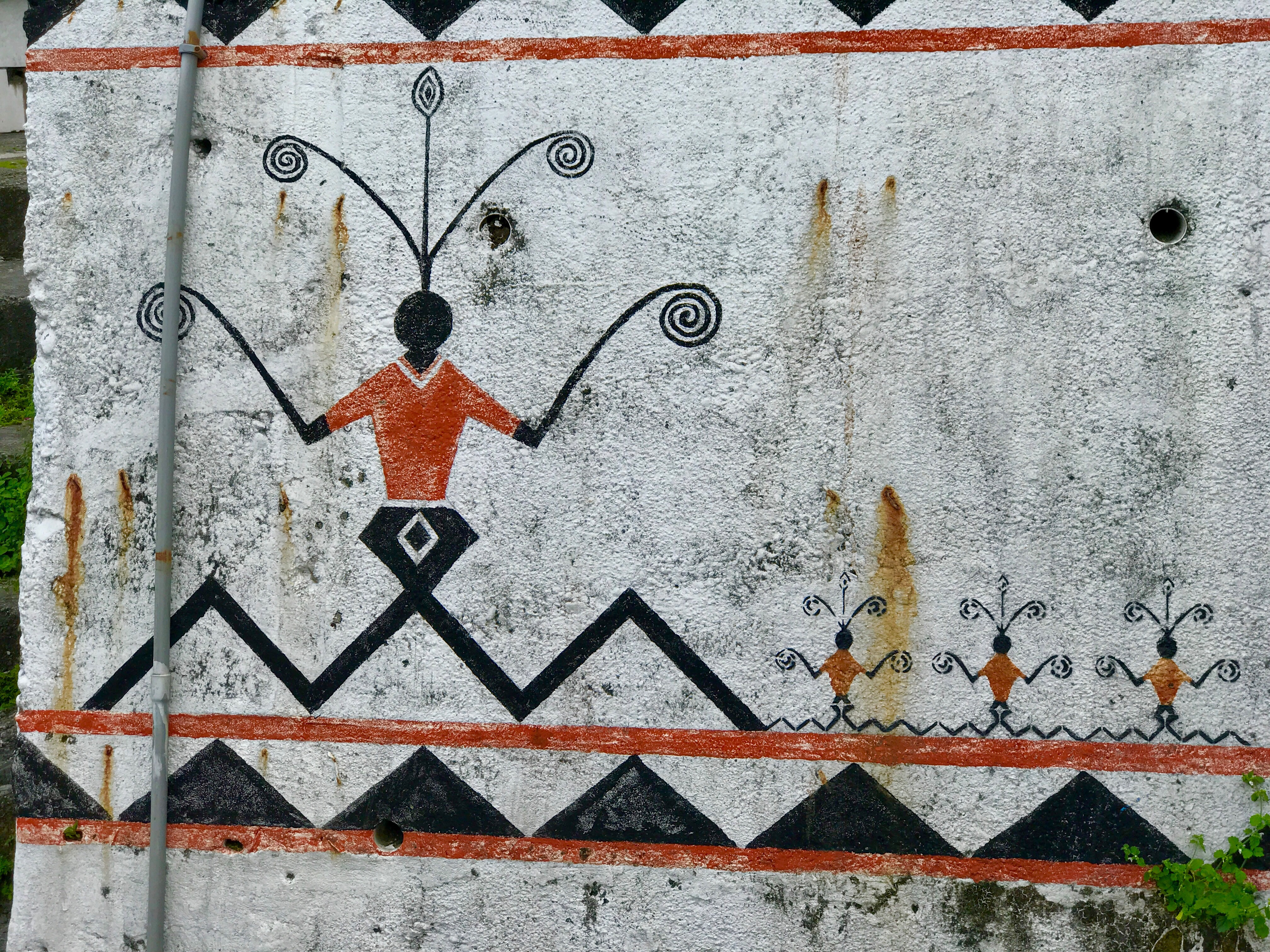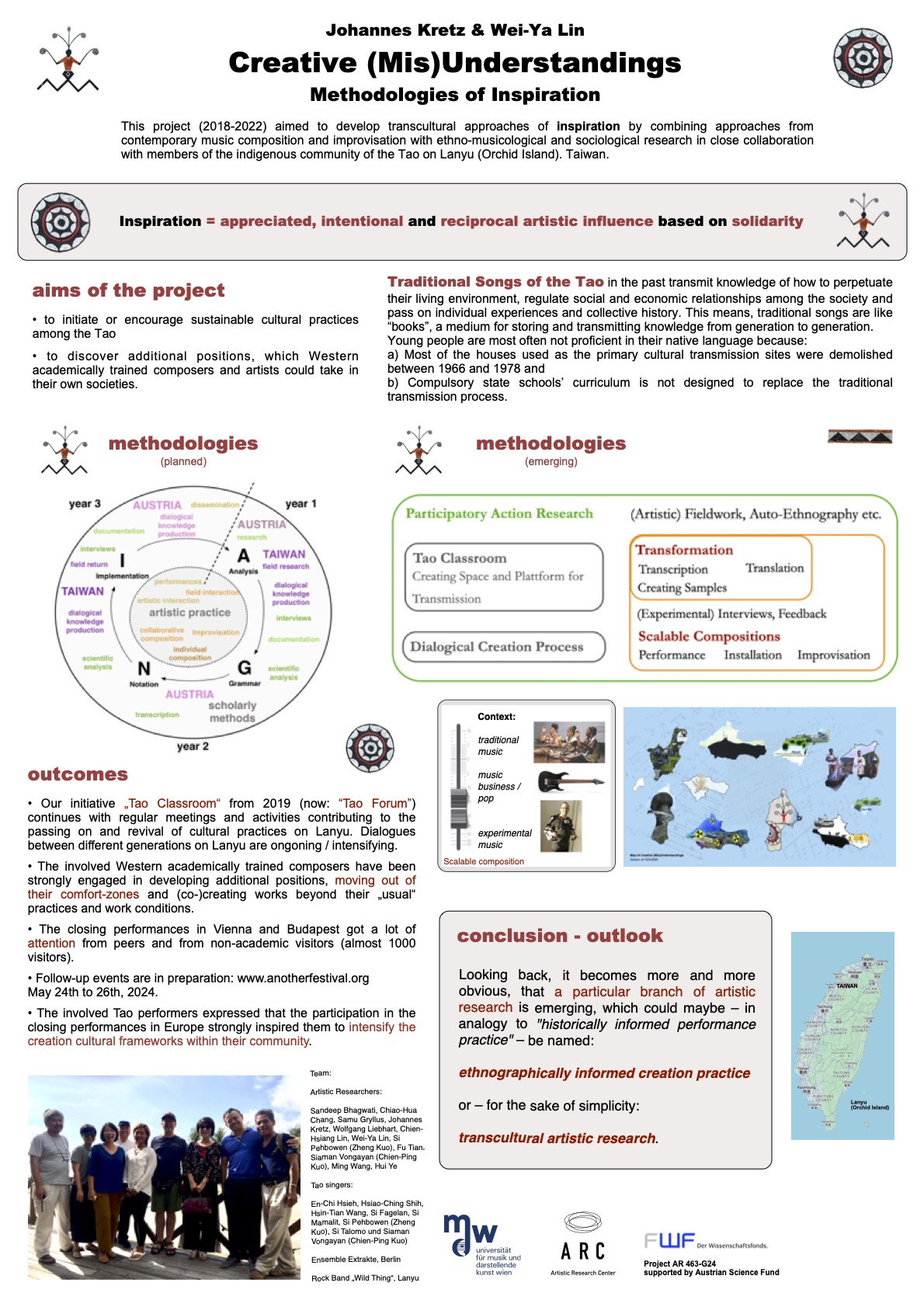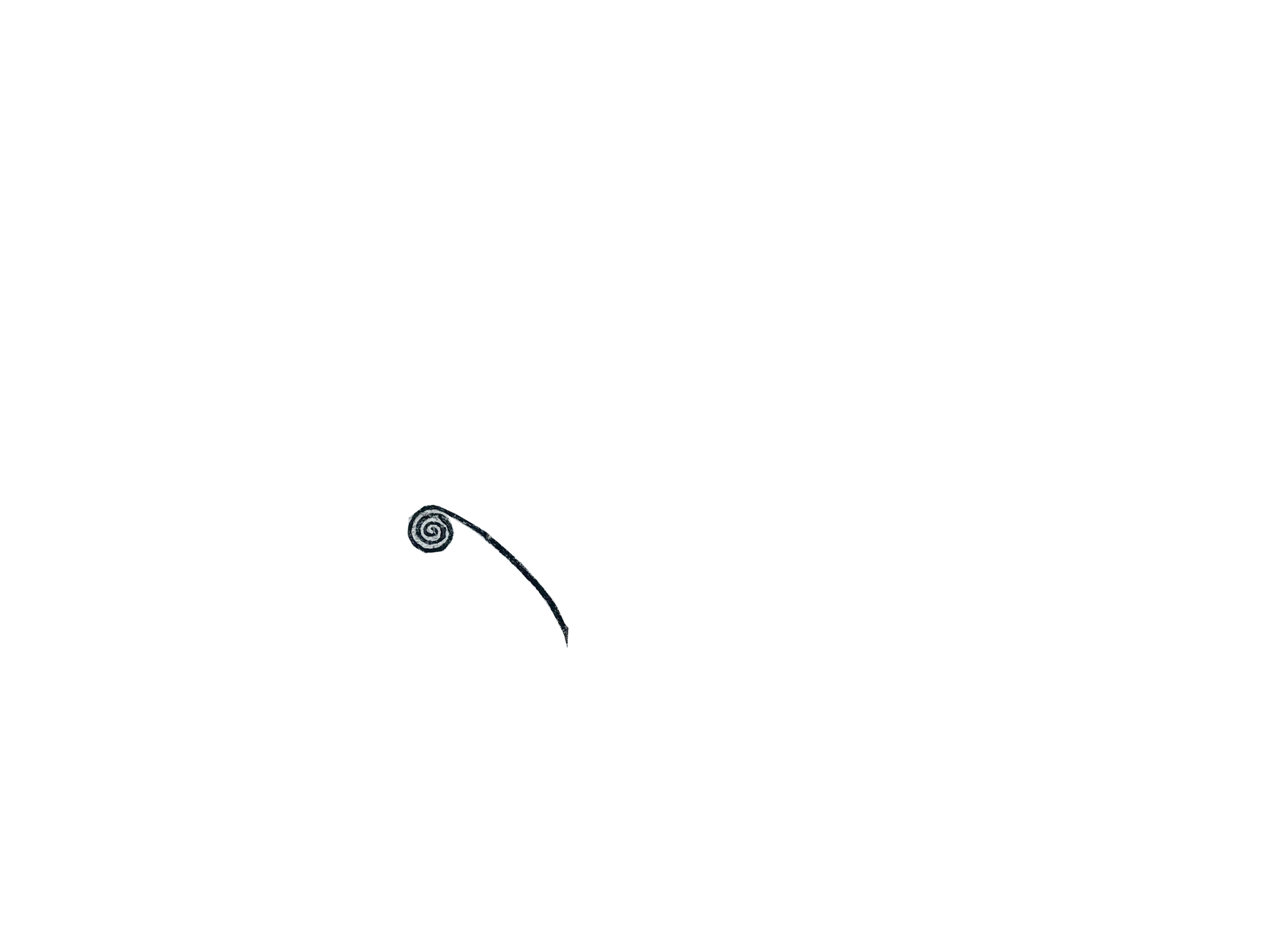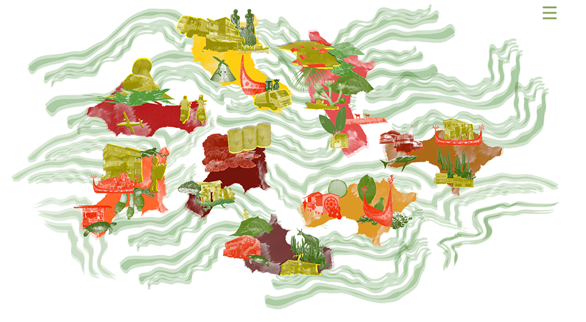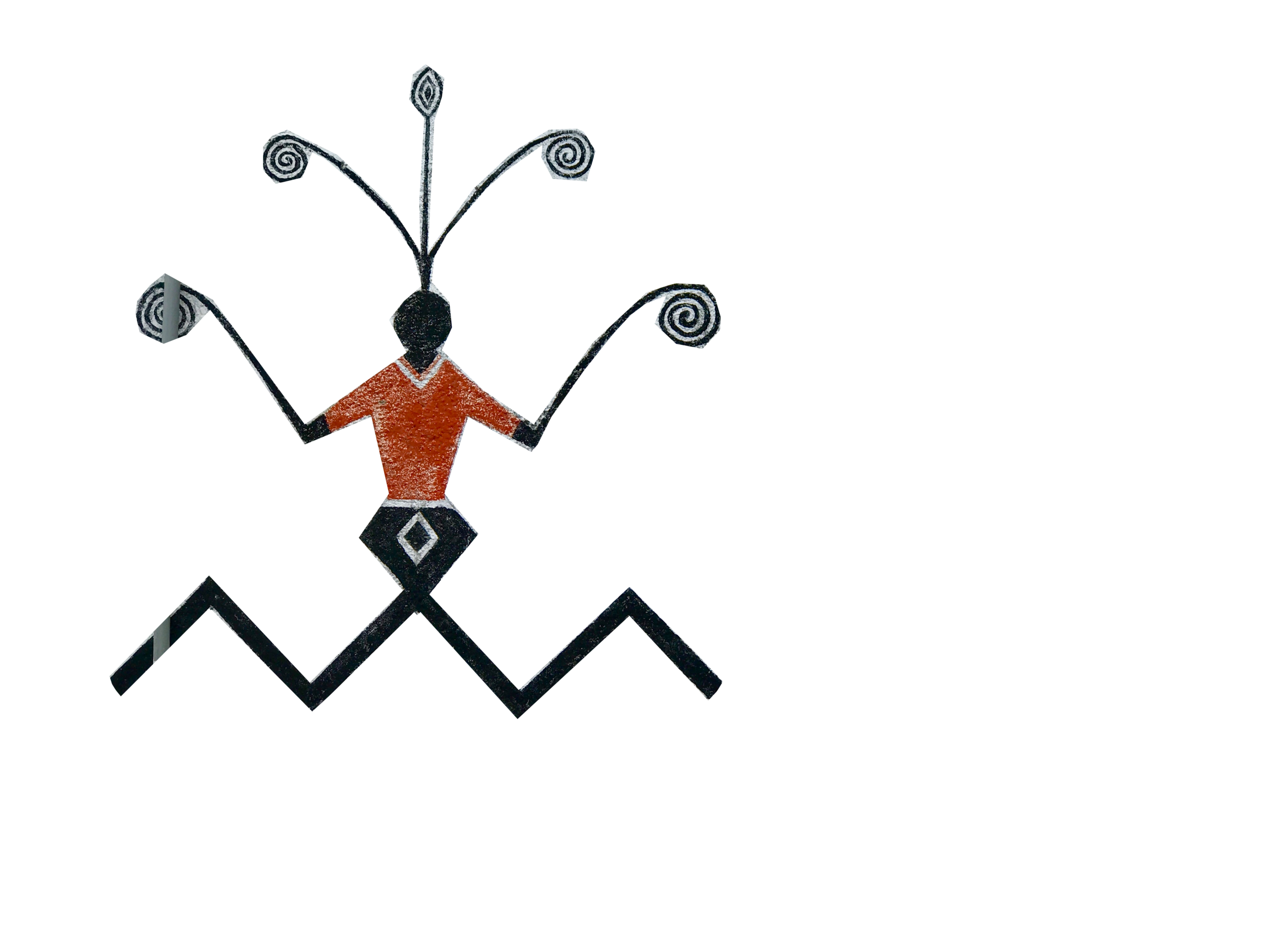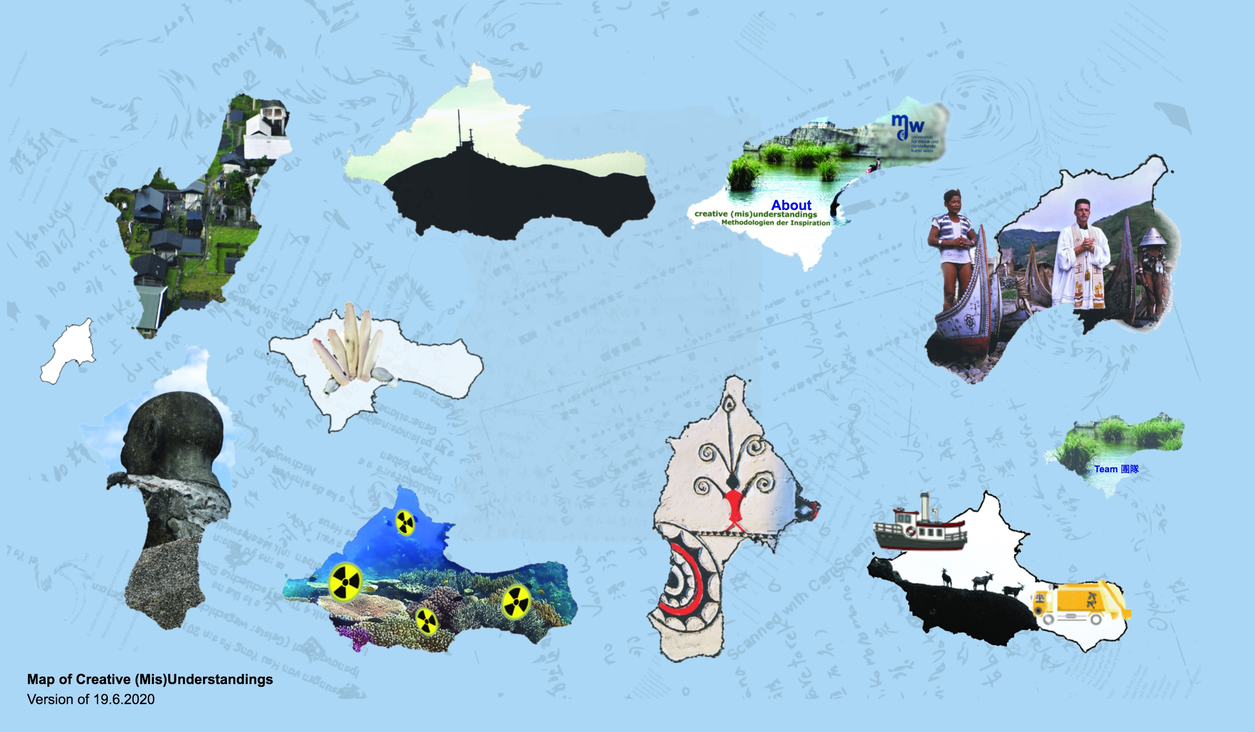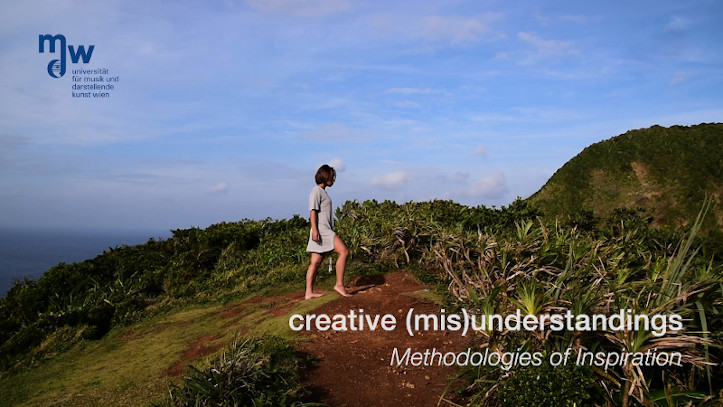Issuer & Owner
creative (mis)understandings
kretz@mdw.ac.at
Responsible for the content
ao.Univ.-Prof. Mag.art. Johannes Kretz
Online team
ao.Univ.-Prof. Mag.art. Johannes Kretz
Mag.art. Wei-Ya Lin, PhD
Mag.phil. Daliah Hindler
Data Protection Declaration
Data Protection Declaration of mdw
Accessibility Statement
Accessibility Statement of mdw
Disclaimer
This Web site may contain information about other proprietary rights and copyright that must be observed. This applies in particular to logos, images, sound files and videos. Downloading, printing and saving files from this Web site is permitted for personal use only. Any other use requires the express approval of the University of Music and Performing Arts Vienna. The University of Music and Performing Arts Vienna assumes no liability for loss of data or other technical problems that may arise when viewing or downloading data from this Web site. The University is not responsible for the content of external Web sites to which this Web site has links.
The information on this Website is carefully checked and regularly updated by the University. The University makes no guarantee as to the completeness, up-to-dateness or accuracy of the information published on this Web site. Errors and omissions excepted. The University further reserves the right to change the content and design of this Web site without prior notice.
The project aimed to develop transcultural approaches of inspiration (seen as mutually appreciated intentional and reciprocal artistic influence based on solidarity) by combining approaches from contemporary music composition and improvisation with ethnomusicological and sociological research in close collaboration with members of the indigenous community of the Tao on Lanyu island, Taiwan. The team developed various subprojects on the basis of the interaction of field research, participatory action research and dialogical art production, which explored the research goals deeper and had a synergetic effect on each other.
On Lanyu a platform of cultural dialog („Tao Classroom“) was established in order to enable the transmission of traditional songs to the younger generation. (Traditional songs are the most important cultural good of the Tao, since their texts represent a collective archive of traditional knowledge.) The project is successfully ongoing independently, reducing the generation gap – caused by discriminatory education politics in Taiwan but also amplified by certain Taboos of the Tao – and triggering new dynamics and ongoing activities of cultural transfer between members of different generations of the Tao.
The participating composers/musicians from Austria / Europe created a rich variety of works, moving out of their comfort-zones and (co)creating works beyond their usual practices and work conditions through dealing in different ways with the knowledge and value system the Tao. This helped to open new discourses in aesthetics and in society. The resulting works were presented in Vienna (Weltmuseum Wien, Heldenplatz, open air), Budapest (House of Music) and on Lanyu (Taiwan) and got a lot of attention from peers and from non-academic visitors. Follow-up events are already under discussion. The involved Tao performers expressed that the participation in the closing performances in Europe strongly inspired them to intensify the creation of cultural frameworks within their community and engage themselves as “ambassadors” of their own culture. The concept of “scalable compositions” was explored intensively. The idea, realizing a work (like the adaptation/transformation of a traditional song) in various instances, which can be adapted to various contexts, suiting both, for events in the indigenous community, in a popular music event or in a new music festival, proved to be a fruitful approach and got a lot of attention. Looking back, it becomes more and more obvious, that with this project a particular branch of artistic research is going to emerge, which could maybe – in analogy to “historically informed performance practice” – be named “ethnologically informed creation practice” or – for the sake of simplicity “transcultural artistic research”. In the meantime, this branch has become quite relevant in numerous dissertation projects at mdw.
The Development of the Research Project
The project aimed to extend the fundamental concepts and methods of contemporary composition and music creation to various transcultural contexts and to develop methods of connecting academic artistic works to the musical world with its great variety of traditions, practices, structures and genres. In the proposal the team described a methodology (called “Extended AGNI”, Kretz 2017 after Bhagwati 2005). While most of the anticipated research in regard to the aims and research questions could be performed as planned, the idea of artistic field research as egalitarian interaction in the field – including audience participation – turned out to be unrealistic, since the value system of the Tao did not encourage to “perform” or experiment in public space. Therefore, other strategies had to be developed to enable dialogical art production. Similarly, the idea of working on a common system of notation or musical grammar turned out to be too far from the concepts and habits of Tao and had to be replaced by other approaches. Finally, the following concepts / sub projects turned out to be successful:
• “Tao Classroom”, a platform for exchange of knowledge and singing practices among Tao from different age groups and gender.
• “Dialogue Research”, an artistic ping-pong game of Tao and western artists sending back and forth little artistic works always one in response of the previous one.
• “Transformation” and “Scalable Composition”, a series of studies on Tao songs, starting from translation of song texts, first in a scholarly way, later in an artistic way, transforming them into different genres like rap, ballades, contemporary compositions, lecture performances etc., collecting feedback from Tao of different generations evaluating the results, and finally also commissioning songs from a Rock Band led by a Tao singer.
Most important results
The project was successful in establishing a reference model for “transcultural artistic research” (or “ethnologically informed creation practice”). While the value system of the Tao community is particularly complex and full of taboos and difficult life situations, which made the collaboration very complex and full of paradoxes, the team could nevertheless develop various strategies of fruitful collaboration – even in times of pandemic.
The closing presentations in Europe and in Taiwan were visited by surprisingly big amounts of interested people, and the team got numerous invitations for guest lectures, conferences and project presentations. We can already observe at mdw a strong interest in artistic dissertations within the frame of mdw’s Dr. Artium Program, which focus on the area between ethnomusicology and composition / interpretation of music. This is surely related to this project hosted at mdw. While it might be too early to measure the impact of the project to the artistic world, we can already observe an increased interest in composition and improvisation in transcultural settings. It is hard to say, to what extend this is caused by this project, though. In consequence of this project a logical continuation would be to address the relation between art/culture and nature in the context of transcultural artistic research more deeply. While many projects now tend to bring nature into concert or exhibition halls as a reaction to the Anthropocene / climate change, the opposite approach – bringing artists into nature with the help and knowledge support of indigenous communities in the widest sense, seems to be a more meaningful further step for the team.
During the project we developed a method of transformative translation of traditional songs of the Tao. The original language is very condensed and refers to a lot of knowledge about the context of Lanyu and certain historical facts, mythological ideas. In order to translate the text into a different genre (like rap or pop song e.g.) and for a different audience, who is not familiar with the original context (and this is the fact even for the younger generation of the Tao), the whole background information of the songs has to be incorporated into the translated text version. Through many examples we developed strategies to expand the text and to preserve the traditional knowledge between the lines conserved in the old song texts.
The project – together with another PEEK project “rotting sounds” – was a key to the sustainable establishment of Artistic Research at mdw. In 2020 the Artistic Research Center (ARC) of mdw was founded and the artistic doctorate program (Dr. Artium Program) was established with 5 new students per year. This program is now in fully operative with 15 students and a team of three artistic researchers (Johannes Kretz, Wei-Ya Lin, Thomas Grill), one professor (Tasos Zembylas, philosophy, sociology) and a management team. Various activities (lecture series and symposium “knowing in performing”, hosting of the SAR conference in 2021, Erasmus+ Strategic Partnership project “RAPP Lab”) were a direct or indirect consequence of this PEEK project, which has led to a good international standing of mdw with regard to artistic research. The number of (successful) PEEK project applications at mdw has grown significantly. In this sense “Creative (Mis)Understandings” was crucial to developing an active role of mdw in field of Artistic Research.
Changes to the Original Project Plan
Due to the pandemic the duration of the project had to be significantly extended in time. In addition to the restrictions of work and academic life, travelling from and to Taiwan was not possible or severely restricted (by long obligatory quarantine times), which forced the team on one hand to rely on online meetings – not well suited for fieldwork– and on the other hand to postpone research trips and/or reduce the number of participants. There were also changes of personnel due to changes in life of some team members (change of residence, change of residency permit – artist visas in Austria do not allow employment as artistic researcher – and illness of a family member). Luckily the project leaders could rely on a significantly large network of experts and open positions could easily be filled with other experts. The closing presentations in Vienna and Budapest were difficult to organize, because the danger of corona infections was still a relevant topic at that time. Originally the team had also planned two larger closing presentations in Taiwan, but again the pandemic situation did not allow any long-term planning, therefore at the end the closing presentation on Lanyu had to be reduced to a rather symbolic form.
Effects of the project beyond the scientific field
On Lanyu island, the dialogue platform “Tao classroom” is continuing on bridging the gap between generations of the Tao community and helping to promote the transfer of traditional knowledge and songs. The Tao team member Chien-Ping Kuo is continuing to transcribe and translate song texts. Finally, thanks to continuous intervention of team members, the biggest archive of Tao songs hosted by LESC•CREM (Université Paris Nanterre, CNRS) is online publicly and (also) available for the Tao community. Our project team gave introductory courses on Lanyu, how to access the archive. The indigenous TV station TITV reported on the project in detail, Austrian Radio Ö1 presented the project in a one hour long feature broad cast (“Zeitton”).
Our junior team member Si Pehbowen from the Tao community was invited in various artistic and academic productions in connection with her participation Creative (Mis)Understandings:
2020 7/28-8/1: International transdisciplinary dance and art cooperation Cloud Gate Dance Theater (Taiwan).
2020/09 Rhythm of lives, dance film production with Taitung 950 dance company.
2020/11/30-12/4: presentation at the First Symposium of the ICTM Study-Group-in-the-Making for Music and Dance in Indigenous and Postcolonial Contexts: “Ontologies and Epistemologies of Indigenous Music and Dance” (online conference)
2020/11: collaboration with Ufa <lipahak ko ‘orip> (happy life): production of a dance video
2020/12/12-13: “one more festival” Taipei, dance choreography, collaboration with Studio Acht.
Presentations
12/2018: Performance Lecture: Performing Artistic Research – Decolonizing Academia’ at the 1st International Research Symposium Colombo, Sri Lanka. (Johannes Kretz and Wei-Ya Lin)
07/2019: Paper by Wei-Ya Lin ‚Activist Research among Tao People’s Society (Taiwan): Creating and Developing New Forms and Spaces for Transmitting Indigenous Knowledge’ in the panel Challenges in Activist Research in Engaged Ethnomusicology with Deborah Wong, Sooi-Beng Tan, Samuel Araujo at the 45th ICTM World Conference in Bangkok, Thailand.
05/2019: Paper by Johannes Kretz and Wei-Ya Lin: ‚Creative (Mis-)understandings: towards a diversity of knowledge production in academia’. Symposium: Wann wird Kunst zur künstlerischen Forschung, Anton Bruckner Privatuniversität, Linz, Austria.
01/2020: guest lecture, department of Musicology, Vienna University
International SAR conference 2020, Bergen: 90 min. performance lecture accepted, due to covid replaced online.
Project Presentation at the 12th SAR Conference 2021 (7.-9.4.2021, online).
Presentation at European Platform for Artistic Research in Music (EPARM) 2020 (cancelled due to covid)
2020/6/19 online presentation event at mdw (online) Version 1, Version 2
2020/11/21: new composition from the project by Samu Gryllus con_nec_ted - a triple trio (12 minutes) premiered at Wien Modern Festival via Live Stream by Ensemble Studio Dan.
2020/12/15: Project presentation at Fuga-Mikrokosmos, episode within the online short film series of Fuga Center for Architecture Budapest, presented by Samu Gryllus.
2020/08/26-28: 7th Symposium of the ICTM Study Group on Applied Ethnomusicology Symposium in Luzern (online), co-organised by mdw, ICTM, the Swizz Society of Ethnomusicology and Hoschule Luzern, Topic: „Performing, Engaging, Knowing”. 90 min. panel with Arno Böhler, Susanne Valerie Granzer, Johannes Kretz and Wei-Ya Lin on ethics, aesthetics and policics, presentation of „creative (mis)undestanding“.
2020-09-25 Roundtable: Rassism and postcolonialism, Artistic Research in the post-colonial era. Creative (mis)understandings (2018-2021) as an example for dcolonizing academia (online), presented by Wei-Ya Lin at the workshop „Rassismus und Postkolonialität in der Musikethnologie/Musikwissenschaft“.
2020-10-22(until 11-27) Exhibition: Songs of Oblivion: Prelude in Vienna by team member Hui Ye in Mz. Baltazar’s Laboratory, Vienna.
2020-11-30 (until 12-03) ICTM Study-Group-in-the-Making for Music and Dance in Indigenous and Postcolonial Context Symposium (Online & presence), panel by Wei-Ya Lin and Chien-Ping Kuo, Lecture Performance by Si Pehbowen, dance workshop by six Tao representatives, workshop on aesthetics of Tao music by Chien-Ping Kuo. National Dong Hwa University, Taiwan.
2020-12-29: guest lecture at the Taipei University for the Arts (online), overview course of the doctoral program. (Lin, Kretz)
2021/3/11: Paper “The Living Tao House and its Social Fabric(ation)” by Leberecht Funk and Wei-Ya Lin, Centre for Asian and Transcultural Studies, Institute of Anthropology, Universität Heidelberg.
2021/3/27: ICTM Dialogues 2021: Panel: “Collaborative Methodologies for Decentring Power Hierarchies in Education, Artistic Research, and Museum Curating” organised by Wei-Ya Lin, with José Jorge de Carvalho (University of Brasília), Matthias Lewy (Lucerne University of Applied Sciences and Arts), Deise Lucy Oliveira Montardo (Federal University of Amazon), Tan Sooi Beng (Universiti Sains Malaysia) and Wei-Ya Lin.
2021/4/28: guest lecture / project presentation by Johannes Kretz and Wei-Ya Lin, at Mozarteum Salzburg, Austria (online).
2021/9/25-26: Participation at BEGEGNUNGEN.ZUHÖREN by Leberecht Funk and Wei-Ya Lin, performance of the multimedia concert instalation ASED (... gegenströmen...) 2021 by Sandeep Bhagwati and Siaman Vongayan at the inauguration of Humbolt Forum, Berlin.
2021/09/29: project presentation by Johannes Kretz at “forum artistic research” at the International Congress of Gesellschaft für Musikforschung in Bonn, Germany.
2021/11/20: project presentation “Creative (Mis)Understandings: An Attempt to Sustainable Solutions for Participatory Action Research” in the panel: "Sustainable Solutions for Participatory Research in Ethnomusicology" organised by Wei-Ya Lin, Symposium ICTM Austria.
2022/1/25-27: Global Musicology – Global Music History. Virtual Conference Dipartimento delle Arti – Università di Bologna, Wei-Ya Lin: Recreating (Music) Histories from the Local Perspectives: Methods, Approaches and Challenges in Creative (Mis)Understandings.
2022/2/3: Earth Day Art Model (Online-Konzert-Performance) Purdue School of Engineering & Technology, USA, Performance of Scalable Songs by Johannes Kretz and Wei-Ya Lin.
2022/7/27 ICTM world conference in Lisboa, Portugal, round table, project presentation, lecture performances together Arno Böhler, Susanne Granzer, Johannes Kretz and Wie-Ya Lin, Colégio Almada Negreiros, Portugal
2022/9/16: project presentation by Wei-Ya Lin, DFG-Netzwerk Artistic Music Research, Berlin, Germany
2022/09/17: Lanyu, Taiwan: workshop “music and dance pedagogics” by Wei-Ya Lin
2022/9/21: ICTM Study Group on Applied Ethnomusicology (AE), Rio de Janeiro, Brazil, project presentation by Johannes Kretz and Wei-Ya Lin (online)
2022/10/20: Tirana (Ablbania), music university, project presentation by Johannes Kretz
2022/11/25 SAR Special Interest Group: Asia Pacific Artistic Research Network, University of Melbourne and the Indonesian Institute of the Arts Yogyakarta, project presentation by Si Pehbowen and Johannes Kretz
2022/11/28: Central European University, Vienna: Lecture and project presentation by Johannes Kretz, Wei-Ya Lin and Samu Gryllus
Closing presentations in Vienna and in Budapest
2022/4/19: Preview event for the „friends of Weltmuseum Wien“
2022/5/20: Weltmuseum: „Long night of research“: Extended closing performance / happening in the building of Weltmuseum Wien, open air event on Heldenplatz with compositions, improvisations, performances, exhibition. More than 700 visitors, presence of media (ORF), ambassadors.
2022/5/23: House of Music Budapest: Closing performance / Happening. More than 200 visitors, same program like 20th May. Presence of media, ambassadors.
2023/2/9: ORF Ö1 (Austrian Cultural Radio Station), Zeitton, one hour feature broadcast about the project by Susanna Niedermayr, inverviews with many team members. Broadcast repeated on Feb.25th 2024.
2023/1/31 - 2023/2/14: return of the project leaders on Lanyu, Taiwan, 4 day symposium with members of the Tao community and Taiwanese scholars and cultural workers
2024/5/24 - 26: Presentation of Tao traditional songs and dance (contemporary and traditional) in the frame of aNOther festival, with support of IGNM, hinterland and Taiwan Cultural and Foreign Ministeries.
2024/5/30 - 2024/6/2: Concert tour in Lithuania. News link. News link, TV link
2024/11/02 - 2025/01/06: HUI YE: The Chant (2024), 8-channel sound installation, five wood constructions Commissioned by Times Museum Guangzhou. As part of the group exhibition One Way Ashore, A Thousand Channels. Guangdong Times Museum, Guangzhou
Maps of Creative (Mis)Understandings
(Presentation of the preliminary project results)
Creative (Mis)Understandings: Methodologies of Inspiration
This project aims to develop transcultural approaches of inspiration (which we regard as mutually appreciated intentional and reciprocal artistic influence based on solidarity) by combining approaches from contemporary music composition and improvisation with ethnomusicological and sociological research. We encourage creative (mis)understandings emerging from the interaction between research and artistic practice, and between European art music, folk and non-western styles, in particular from indigenous minorities in Taiwan. Both comprehension and incomprehension yield serendipity and inspiration for new research questions, innovative artistic creation, and applied follow-ups among non-western communities.
The project departs from two premises: first, that contemporary western art music as a practice often tends to resort to certain degrees of elitism; and second, that non-western musical knowledge is often either ignored or merely exploited when it comes to compositional inspiration. We do not regard inspiration as unidirectional, an “input” like recording or downloading material for artistic use. Instead, we foster artistic interaction by promoting dialogical and distributed knowledge production in musical encounters. Developing interdisciplinary and transcultural methodologies of musical creation will contribute on the one hand towards opening up the—rightly or wrongly supposed—“ivory tower of contemporary composition”, and on the other hand will contribute towards the recognition of the artistic value of non-western musical practices. By highlighting the reciprocal nature of inspiration, creative (mis)understandings will result in socially relevant and innovative methodologies for creating and disseminating music with meaning.
The methods applied in the proposed project will start out from ethnographic evidence that people living in non-western or traditional societies often use methods of knowledge production within the sonic domain which are commonly unaddressed or even unknown among western contemporary music composers (aside from exotist or orientalistic appropriations of “the other”).
The project is designed in four stages: field research and interaction with indigenous communities in Taiwan with a focus on the Tao people on Lanyu Island, collaborative workshops in Vienna, an artistic research and training phase with invited indigenous Taiwanese coaches in Vienna, and feeding back to the field in Taiwan. During all these stages, exchange and coordination between composers, music makers, scholars and source community experts will be essential in order to reflect not only on the creative process, but also to analyse and support strong interaction between creation and society. Re-interaction with source communities as well as audience participation in the widest sense will help to increase the social relevance of the artistic results.
The University of Music and Performing Arts Vienna (MDW) will host the project. The contributors are Johannes Kretz (project leader) and Wei-Ya Lin (project co-leader, senior researcher) with their team of seven composers, ten artistic research partners from Taiwan and six artistic and academic consultants with extensive experience in the relevant fields.
May 20th Weltmuseum Wien (the museum of the world Vienna)
May 23rd Magyar Zene Háza (House of Music, Hungary)
Closing presentation in Weltmuseum Wien on May 20, 2022, 4:00-11:00 pm
The Artistic Research Project Creative (Mis)Understandings is based on a collaboration between poet-singers of the indigenous group Tao from Taiwan and composers and sound creators trained in the tradition of European Art Music. The project aims to create strategies which on the one hand contribute to revitalizing Tao cultural practices in a sustainable way, and on the other hand redefine social roles of European, academically trained composers and sound creators.
As part of the „Long Night of Research (Lange Nacht der Forschung)“ we will present – in an extended happening – the encounter of culture and traditional singing of the Tao in performance-exhibition format. This includes performances of traditional Tao song and dance, compositions and improvisations transforming the songs into various contemporary contexts in styles of rock, experimental, European art music etc., complemented by sound and video installations. There will also be time for exchanges, meetings, dialogues with the audience, what may create a platform of sharing and encounters during this event.
Contributions
| 4:00 PM | PONSO NO TAO | Video installation by Wolfgang Liebhart and Chiao-Hua Chang |
| 04:00 | Songs of Oblivion | Video installation by Hui Ye |
| 04:30 | Wild Thing | Taiwanese rock band |
| 05:30 | Opening speeches | |
| 06:00 | Voice of Ocean | Traditional chants of the Tao |
| 06:15 | ASED (…countercurrents…) | Concert installation by Sandeep Bhagwati |
| 06:45 | Transformations - Encounters - Performances | Pieces by Tian Fu, Samu Gryllus, Johannes Kretz, Wolfgang Liebhart, Wei-Ya Lin, Chien-Hsiang Lin, Si Pehbowen a.o* |
| 07:15 | Voice of Ocean | Traditional chants of the Tao |
| 07:45 | Transformations - Encounters - Performances | Pieces by Tian Fu, Samu Gryllus, Johannes Kretz, Wolfgang Liebhart, Wei-Ya Lin, Chien-Hsiang Lin, Si Pehbowen a.o. |
| 08:15 | Wild Thing | Taiwanese rock band |
| 09:00 | ASED (…countercurrents…) | Concert installation by Sandeep Bhagwati |
PONSO NO TAO
The music education work focused on the young and youngest Tao generation. For the different age groups, ranging from pre-school children to 15- and 16-year-old youths, numerous confidence-building games were used to get to know each other. Concentration and coordination exercises, some of which were taken from music therapy followed. Dance and theatrical concepts as well as sound painting have been used too. Extensive acoustic, visual and descriptive documentation material is existing of all activities. Some of it is summarised in the short film "Ponso No Tao".
Songs of Oblivion is a work series initiated from research on the unique singing tradition of Tao as well as on a shadowy part of the island’s history established by the post-war Taiwanese government.
By juxtaposing the ancient sonic culture of Tao and narrations of individual aural memory regarding historical details of the former Lanyu farm (1958-1990), the artist aims to explore the complexity of relationship between a certain political event and its long-term impact reflected in the collective memory.
ASED (...countercurrent...) is based on a traditional song (anood) that Tao singer and indigenous
activist Siamang Vongayan recorded five times at various important locations on his island of Lan Yu.
These video films now appear in unpredictable order on screens in a public space,
in which 5 musicians from different musical traditions react to them. Each* musician has on the one hand
number of instructions that guide the musical interaction with spatial sound, audience behavior and
on the other hand the task to "honor" the singing of Vongayan and to imitate it musically from their own tradition or to
imitating or accompanying Vongayan's singing out of one's own tradition.
Multimedia dance performance
Connected Islands is an Event Piece for any participating community including improvising instrumentalists or other professional performers as well as members of any audience members. The aim of the piece is to create a conscious collective behavior with the help of a set of rules. These form a community in the similar way as a society uses taboos in daily life. The piece operates through simply formulated verbal instructions (in printed or projected form)Some of these instructions are inspired by the vocal ritual practice or other social norms and rules of the Tao community. Participating in the realization of the piece allows the community to reflect on its daily habits or unconsciously learned behavioral routines with the help of some easy and playful rules.
Ten Easy Steps to Meet Difficulties (collective participation
Dialogue research (multimedia performance for dancer and electronics)
Vie aux Lanyu for viola and electronics
Lanyu Songbook: scalable compositions for voices, dancer, erhu, viola, pipa, bass, and electronics
A lecture performance demonstrates the team’s work of transforming traditional Tao songs into various musical genres, ranging from rap to experimental improvisation. Stories and myths from Tao culture are expressed and transferred into contemporary art forms.
The Lost Garden of Eden - electroacoustic compositions
A hundred years ago, the indigenous people "Tao" in Lanyu were considered and researched as living fossils from the Stone Age. But already in the second half of the 20th century, the tradition and life of Tao were greatly changed by the influences of the Chinese and the Christian mission.
In recent years, because of the rapidly increasing tourism and politics of the Taiwanese government is nature in Lanyu very polluted.
The traditional culture of Tao has been lost a lot, but the economic situation has improved significantly. This creates a large area of tension between tradition, modern materialism, cultural identity, environmental problems and social relationships.
After 3 weeks on this charming island, I tried to reflect the current situation of Lanyu with a few electro-acoustic compositions.
Hui Ye, Wei-Ya Lin, Johannes Kretz, Samu Gryllus
Performance of Oblivion for viola, dulcimer and electronics (2 performers)
Fu Tian
Salted Golden Shine: Composition für rap and electronics
